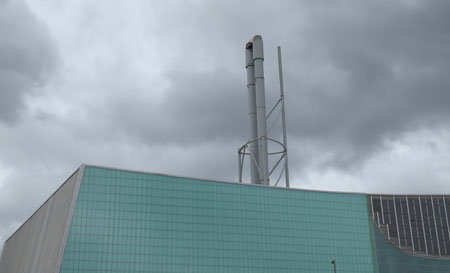Waste management companies and manufacturers of energy from waste technology have called on the European Commission to recognise there is a need for more EfW plants.
The call comes in the wake of a “Communication” from the European Commission last week which warned against public investment contributing to EfW (energy from waste) overcapacity.

More energy from waste will be needed as waste is diverted from landfill, claims the ESWET technology organisation
In its Communication, the Commission also warned that feedstocks for energy from waste plants could be limited if circular economy proposals to increase the recycling of waste are successful (see letsrecycle.com story ).
Now, the manufacturers of EfW technology through their trade body ESWET are claiming that the Commission’s own research has indicated there could be an increasing amount of feedstock for EfW. This is because its own JRC Science Report (click here for PDF) suggested that energy recovery is likely to increase to support “the necessary massive diversion from landfill. Moreover, higher recycling rates for other waste types may lead to a further increase in the generation of sorting residues, unless the quality of the materials collected separately at source improves.”
Uneven
ESWET also points out that incineration capacity is unevenly spread within the EU with 13 Member States still landfilling more than 50% of their municipal waste and that they have no or very little EfW capacity.
Furthermore, the organisation points out that the Commission is focusing on municipal waste rather than commercial and industrial waste and it is difficult to identify the share of mixed municipal waste and non-municipal waste in the plants.
Consequently ESWET advises caution when talking about risk of overcapacities because “Municipal waste generation and Waste-to-Energy capacities are therefore figures that are difficult to compare”.
ESWET also calls for metal recycling from incinerator bottom ash to have more attention. It says: “Thermal energy treatment allows to recover 80kg of metals from 1 tonne of residual waste that otherwise would be buried in a landfill.”
Imbalances
The waste management companies, through their European organisation FEAD, have commented that it is essential to stress “that there is no waste to energy overcapacity at EU level at the moment. The imbalances of energy capacity between the Member States must be clearly identified so that the network of waste to energy facilities can be used more efficiently.”
And, FEAD has also queried the Commission’s proposal on the grounds whether it has taken commercial and industrial waste into account.
FEAD said it would have liked the Communication to further stress the contribution of waste to energy in dealing with residual waste and in strengthening the EU energy independency and efficiency. Moreover, it must be recognised that the energy recovery sector plays a crucial role in extracting value from some of the wastes which cannot be treated further up the hierarchy (e.g sorting residues from recycling).
The post Commission tackled over EfW Communication appeared first on letsrecycle.com.
Source: letsrecycle.com Plastic


